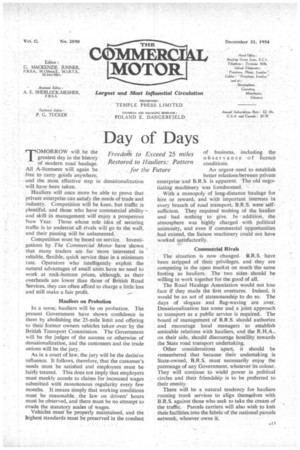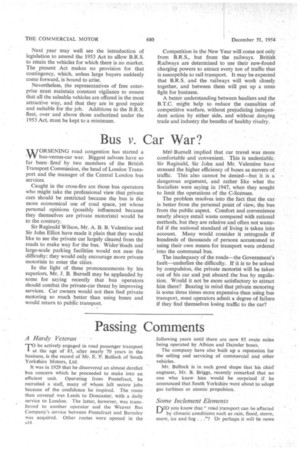Day of Days
Page 15

Page 16

If you've noticed an error in this article please click here to report it so we can fix it.
TOMORROW will be the greatest day in the history of modern road haulage. Restored to Hauliers: Pattern All A-licensees will again be . for the Future free to carry goods anywhere,
Freedom to Exceed 25 miles
-and the most effective step in denationalization will have been taken.
Hauliers will once more be able to prove that private enterprise can satisfy the needs of trade and industry. Competition will be keen, but traffic is plentiful, and those who have commercial ability — and skill in management will enjoy a prosperous New Year. Those whose sole idea of securing traffic is to undercut all rivals will go to the wall, and their passing will be unlamented.
Competition must be based on service. Investigations by The Commercial Motor have "shown that many traders are far more interested in reliable, flexible, quick service than in a minimum rate. Operators who intelligently exploit the natural advantages of small units have no need to work at rock-bottom prices, although, as their overheads are lower than those of British Road Services, they can often afford to charge a little less and still make a fair profit.
Hauliers on Probation In a sense, hauliers will be on probation. The present Government have shown confidence in them by abolishing the 25-mile limit and offering to their former owners vehicles taken over by the British Transport Commission. The Government will be the judges of the success or otherwise of denationalization, and the customers and the trade unions will be the jury.
As in a court of law, the jury will be the decisive influence. It follows, therefore, that the customer's needs must be satisfied and employees must be fairly treated. This does not imply that employers must meekly accede to claims for increased wages submitted with monotonous regularity every few months. It means simply that working conditions must be reasonable, the law on drivers' hours must be observed, and there must be no attempt to evade the statutory scales of wages.
Vehicles must be properly maintained, and the highest standards must be preserved in the conduct of business, including the observance of licence conditions.
An urgent. need to establish better relations between private enterprise and B.R.S. is apparent. The old negotiating machinery, was foredoomed.
With a monopoly of long-distance haulage for hire or reward, and with important interests in every branch of road transport. B.R.S. were selfsufficient. They required nothing of the haulier and had nothing to give. In addition, the atmosphere was highly charged with political animosity, and even if commercial opportunities had existed, the liaison machinery could not have worked satisfactorily.
Commercial Rivals The situation is now changed. B.R.S. have been stripped of their privileges, and they are competing in the open market on much the same footing as hauliers. The two sides should be ,willing to work together for the good of all.
The Road Haulage Association would not lose face if they made the first overtures. Indeed, it would be an act of statesmanship to do so. The days of slogans and flag-waving are over. Denationalization has come and a joint approach to transport as a public service is required. The board of management of B.R.S. should authorize and encourage local managers to establish amicable relations with hauliers, and the R.H.A., on their side, should discourage hostility towards the State road transport undertaking.
Other considerations apart, it should be remembered that because their undertaking is State-owned, B_R.S. must necessarily enjoy the patronage of any Government, whatever its colour. They will continue to wield power in political circles and their friendship is to be preferred to their enmity.
There will he a natural tendency for hauliers running trunk services to align themselves with B.R.S. against those who seek to take the cream of the traffic. Parcels carriers will also wish to knit their facilities into the fabric of the national parcels network, whoever owns it. Next year may well see the introduction of legislation to amend the 1953 Act to allow B.R.S. to retain the vehicles for which there is no market. The present Act makes no provision for that contingency, which, unless large buyers suddenly come forward, is bound to arise.
Nevertheless, the representatives of free enterprise must maintain constant vigilance to ensure that all the saleable vehicles are offered in the most attractive way, and that they are in good repair and suitable for the job. Additions to the B.R.S. fleet, over and above those authorized under the 1953 Act, must be kept to a minimum. Competition in the New Year will come not only from B.R.S., but from the railways. British Railways are determined to use their new-found charging powers to attract every ton of traffic that is susceptible to rail transport. It may be expected that B.R.S. and the railways will work closely together, and between them will put up a stem fight for business.
A better understanding between hauliers and the B.T.C. might help to reduce the casualties of competitive warfare, without prejudicing independent action by either side, and without denying trade and industry the benefits of healthy rivalry.












































































